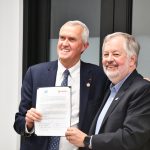Wisconsin Conservation Voters Spends Big
Green group has spent $3.85 million since 2010, mostly for Democratic candidates.
Wisconsin Conservation Voters, a statewide environmental policy and issues advocate, is one of the top spenders on electioneering activities to support mostly Democratic legislative and statewide candidates.
The group, which is about 20 years old, has doled out $3.85 million since 2010 on independent expenditures to sponsor get-out-the-vote activities like door-to-door and telephone canvassing. Conservation Voters also sponsors broadcast and online advertising to support and oppose candidates.
The group’s top outside election expenditures include:
- $1.3 million in the 2014 governor’s race to oppose former GOP Gov. Scott Walker and support Democratic challenger Mary Burke;
- About $653,800 in the 2018 governor’s race to oppose Walker and support Democratic candidate Tony Evers;
- $584,225 in fall 2020 to support Democratic candidates in 13 legislative races;
- About $410,580 in fall 2018 to support Democratic candidates in two legislative races;
- $100,000 in spring 2019 to support Appeals Judge Lisa Neubauer’s bid for a seat on the Wisconsin Supreme Court.
In addition to electioneering spending on behalf of candidates, Wisconsin Conservation Voters has also made $106,036 in direct PAC contributions to candidates between January 2010 and December 2021.
The top recipients include:
- Former Democratic Rep. Tom Nelson, of Appleton, who was also a 2014 candidate for lieutenant governor, $10,500;
- Democratic Gov. Tony Evers, $8,000;
- Democratic Lt. Gov. Mandela Barnes, $6,150;
- Former Democratic candidate for governor Mary Burke, $6,000;
- Former Democratic candidate for governor Tom Barrett, $5,000.
Aside from electioneering, Conservation Voters is a lobbying group that uses education and advocacy on environmental issues and policy to mobilize its members and elected officials.
The group’s legislative priorities include safe drinking water, clean energy, and a healthy democracy. At the State Capitol, Wisconsin Conservation Voters lobbies on dozens of bills over the years mostly affecting air, land, and water pollution, shoreland zoning, mining, and groundwater, and wetland and high-capacity well oversight and regulation.
Between 2011 and 2021, the group spent $1.24 million lobbying the governor and legislature. During most of that time, the governor’s office and legislature were controlled by Republicans.
Twenty-six bills backed by the group became law and 30 bills opposed by Wisconsin Conservation Voters also became law during the time.
Laws backed by the group included:
Local assistance for contaminated wells and failing wastewater systems;
A process for local water utilities to provide assistance for lead service line replacements;
Requiring the open seasons for hunting or trapping pheasant, gray partridge, fisher, fall turkey, and the archery deer season to end on the Sunday nearest Jan. 6, subject to exceptions,
Allowing towns to enact tougher shoreland zoning ordinances than counties in some cases;
Increasing state financial assistance for local government recycling programs;
Prohibiting the manufacture and sale of personal care products and over-the-counter drugs containing synthetic plastic microbeads;
Creation and regulation of prescription drug disposal programs.
Wisconsin Conservation Voters opposed laws that:
Weakened sulfide mining restrictions;
Prohibited the state from enacting tougher federal standards on wood-burning stoves than those effective in 2014;
Paved the way for Foxconn to build a $10 billion manufacturing plant in southeastern Wisconsin;
Lifted moratoriums on nuclear power plant construction and metallic mining;
Loosened state oversight and approval of controversial high-capacity wells;
Restricted local control over property development and the repair, replacement, or remodeling of structures in a shoreland setback area that were legally located there prior to July 2015;
Allowed an open-pit iron mine in northern Wisconsin. The company that wanted the project later backed out.
Campaign Cash
-
Outside Groups Spent Record $28.8 Million on State Supreme Court Race
 May 7th, 2023 by Erik Gunn
May 7th, 2023 by Erik Gunn
-
Top 20 Donors to State Political Parties
 Apr 4th, 2023 by Peter Cameron and Hina Suzuki
Apr 4th, 2023 by Peter Cameron and Hina Suzuki
-
$38 Million Spent on High Court Race
 Mar 29th, 2023 by Erik Gunn
Mar 29th, 2023 by Erik Gunn






















